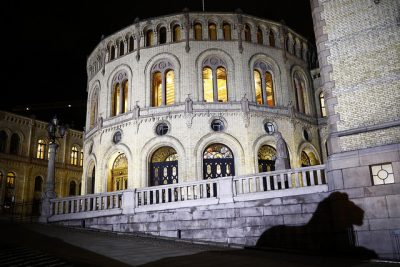Norway’s Parliament building (Stortinget) will be the scene of some very heavy post-election dealmaking over the next few months. Both the right- and left sides of Norwegian politics will be seeking favour from the small, centrist and newly independent Christian Democrats party, which will likely keep playing hard-to-get in a bid to boost its visibility and influence.

The Christian Democrats’ decision to sever formal ties with Prime Minister Erna Solberg’s conservative coalition leaves them in an independent and powerful position, out of proportion to the 4.2 percent of vote they won in the September 11 election. Solberg is left to coddle or even placate them, to keep them on the side of her minority coalition, while the other parties in opposition will waste no time in trying to win their favour, too. Several of the opposition parties already have a list of tailor-made issues ready to appeal to the Christian Democrats, that could swing them over to their side, and thus form a new majority against Solberg.
Labour, still nursing the wounds from its election loss, has nonetheless announced several proposals it will make in the opening days of Parliament to tempt the Christian Democrats over to their side. Now the Socialist Left party (SV) has come out strong on the offensive as well, with a package of proposals also aimed at winning the Christian Democrats’ favour.
They include special funding for families with seriously ill children and an increase in the monthly child welfare payments (barnetrygden) that all families in Norway already receive. Both proposals cater to the Christian Democrats’ family-friendly policies.
Testing the Christian Democrats’ new independence
SV will also propose a measure limiting class size in the first- to fourth grades to just 15 students per teacher and 20 in the fifth to 10th grades. It also wants to curtail so-called “welfare profiteers” (private firms that win contracts to carry out government services in Norway, especially within health care). SV has further proposed creation of a plan for obligatory carbon emissions cuts and wants to force Norway into supporting an international ban on nuclear weapons.
All these issues are meant to appeal to the Christian Democrats, and thus help socialist parties like SV reap some benefits from their own election victories. SV was among the “winners that lost” in the recent parliamentary election, seizing more voter support but not enough to prevail with their policies. By winning support from the Christian Democrats, their fortunes could improve.
“If the Christian Democrats are serious about being independent, and if the other parties in opposition (Labour, Center, the Greens and the Reds) are serious about voting for what they’re for and not against, we can come together quite often,” SV leader Audun Lysbakken told new bureau NTB over the weekend.
The Center Party will also try to get the Christian Democrats on their side. They want to win even more state support and protection for farmers along with funding for Norway’s outlying districts, in the form of everything from infrastructure improvements to more social welfare and local economic development programs. The Christian Democrats also favour such projects, and Center Party leader Tryvge Slagsvold Vedum has started courting the Christian Democrats’ leader Knut Arild Hareide, to clear the way for more political cooperation. The Christian Democrats lost voters to Center in the last election, and now have the chance to prove that they’re district- and farmer-friendly as well.
Election decided several other issues
There are several issues, though, that the election itself decided because of the non-socialist majority that resulted. Plans to expand the busy E18 highway into Oslo can now move forward, despite opposition from the Labour- and Greens-led Oslo city government. Other major roadbuilding projects, and the government’s reform of both roadbuilding and the railroad in recent years won’t be reversed.
The fate of municipal government reforms is less clear, because the Christian Democrats voted against some municipal mergers that were forced through by the government. Regional (county) government reforms will stand, because they were supported by the Christian Democrats. So will reforms of the military and liberalization of employment regulations.
Immigration policy is also likely to continue, mostly because it’s supported by the biggest parties including both Labour and the Conservatives. There’s unlikely to be any major tax increases, since Labour lost its unpopular campaign promise to raise them NOK 15 billion to shore up social welfare spending, but more tax cuts are less likely.
Reversals of some government triumphs may still occur, for example on cuts in paid paternity leave, cutbacks and reorganization of Norway’s home guard (Heimevernet) and whether Norway will continue to send convicts to a prison in the Netherlands, because of a shortage of prison space in Norway.
The dealmaking and invitations for cooperation are already underway. While the socialist parties in opposition will try to woo the Christian Democrats over to their side, Solberg’s conservative coalition with the Progress Party will be careful not to provoke either the Christian Democrats or the non-socialist Liberals, to keep them both on their side.
newsinenglish.no/Nina Berglund

